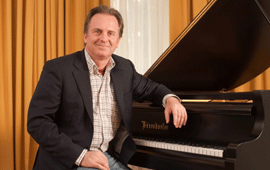> [Archived] Interviews

The 'Lipatti Days' Festival - Interviewing Pianist Alfredo Perl
You will start the marathon recital as part of 'Lipatti Days' on December 2nd. How did you receive this invitation?
I was very glad, of course I performed on the stage of the Romanian Athenaeum, at the'George Enescu' Festival a few years ago, so it is a double joy because ever since that day I have always wanted to perform in Romania again. As to the recital in December, during the 'Lipatti Days' Festival, I am certainly happy because the name of Dinu Lipatti is very significant for a pianist of my generation. Since my childhood, in Chile, where I grew up, I have listened to all records of this pianist and I have admired him a lot. Therefore, this is my third reason for joy.
You studied in Chile first, then in Germany and Great Britain. How did each of these music schools and cultures have influenced you?
I could say that this is a good thing, too, that all these piano schools were not in contradiction, I did not have to 'learn again'. I think that from the musical point of view it was a continuous line for me, starting with my professor in Chile and then continuing with another in Germany and then with somebody else in London. I was lucky, too, it is very important to let different influences work on you, but there must always be a guiding line, too, and thanks God, I had it. I think that from the pianistic point of view, there were a few differences between the three schools, but this aspect becomes visible at a given moment and because each pianist has his pianism and his own corporeality; all three professors, belonging to different pianistic schools, helped me with my own development.
Had any of the professors and musicians you have worked with a decisive role in your career?
In my career? I could not think of anyone in particular, in fact I do not think that my career has been influenced by other musicians, I could say that I have made great efforts struggling with much patience and strength. Artistically speaking, Claudio Arrau's personality was significant for me since my childhood, whom unfortunately I did not meet because he did not perform in Chile as long as I lived there. Then there were other musicians, too, such as Alfred Brendel, who had also a strong influence upon me.
You are appreciated for performing Beethoven's opuses: you have also recorded all his piano sonatas. Why Beethoven and what does this personality mean to you?
I think that it is Beethoven's music that made me choose the piano. When I was five I listened to a record of a Trio by Beethoven. I think that this is the only memory I still have had since that age. I remember the sonority and expressivity that have impressed me a lot ever since and this has never changed. Many other aspects of Beethoven's music have been added in time, for instance , I think that its very strong vitality has guided me to his music.
One of Beethoven's sonatas is also in the programme of the recital in Bucharest, alongside the works by Schuman and Ravel. How did you choose this programme?
To me it is important to bring in the same programme pieces that are interlinked, but not by pragmatism or titles, but by aspects such as tonality and I can say that I let myself guided by my intuition. When I hear in my mind the latter part of Beethoven's Piano Sonata No 17, The Tempest in B - flat major, it is continued in my opinion with the beginning of the piece Carnival of Vienna by Schuman which is also in B- flat major, too. As to Ravel's pieces, I performed all his pieces for piano. But Alborada del Gracioso was also one of Lipatti's most well-known records, so this is my homage to this pianist.
You are not only a pianist but also a conductor, an artistic director of the Detmold Chamber Orchestra and professor at the Hochschule für Musik Detmold. How can you manage to combine the soloistic, conducting and pedagogic career?
It is very much and I think that an artist cannot do all these activities simultaneously for all; this is hard work. But I cannot say how this dilemma will be solved in the end. In order to answer to your question I do face all activities for the time being with great effort and it cannot work years on end at the same pace. But I do not know how it will continue. What my major musical activities will be, what I will do more or less, we will see. But I am fine for the time being ..
Translated by Voicu Dianaand Elena Daniela Radu
MTTLC, Bucharest University














